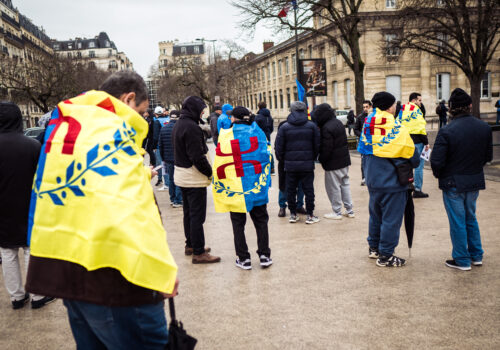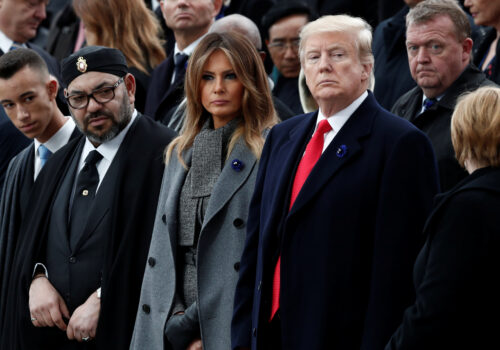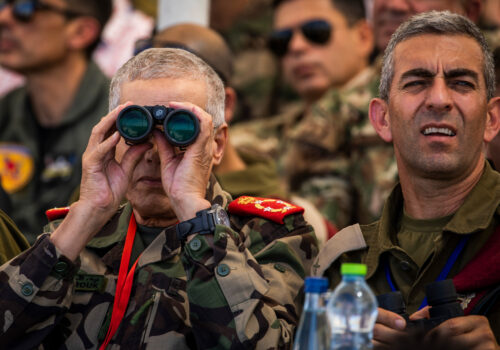The UN’s Western Sahara vote marks a diplomatic ‘Green March’
The United Nations Security Council (UNSC) voted last month for a historic resolution regarding the disputed territories of Western Sahara, endorsing the Moroccan 2007 autonomy proposal, which puts the territories under the kingdom’s sovereignty. The landmark vote comes after years of increased international momentum around the autonomy plan and lays the foundation for a resolution for the Sahrawi people, who have been held hostage to Moroccan-Algerian regional rivalry for fifty years.
Last month’s vote—which constitutes a rupture from the status quo of the international community’s decades-long balancing act between Moroccan and Algerian interests—came days before the celebration of the fiftieth anniversary of the 1975 Green March. The event saw a peaceful, Moroccan-led march of 350,000 people lead to the liberation of Western Sahara from Spanish colonialism.
When Spain withdrew, Morocco asserted historical claims of sovereignty over the territories, while the Polisario Front declared the Sahrawi Arab Democratic Republic and sought full independence. The ensuing war and its 1991 cease-fire left the region divided by a fortified berm and a frozen political process.
Originally brought to the UN in 1963 as a decolonization issue, Western Sahara remains one of the world’s most protracted, unresolved conflicts.
Persistent challenges remain after last month’s landmark vote. Importantly, the Polisario Front has categorically rejected the UN resolution, stating that “it violates the territory’s decolonization status and undermines the UN peace process by supporting Morocco’s autonomy plan.”
But today, Morocco is nevertheless experiencing a similar dynamic to that hopeful moment in 1975, with the success of a series of well-orchestrated diplomatic victories, “marching” intently toward a lasting resolution of the conflict.
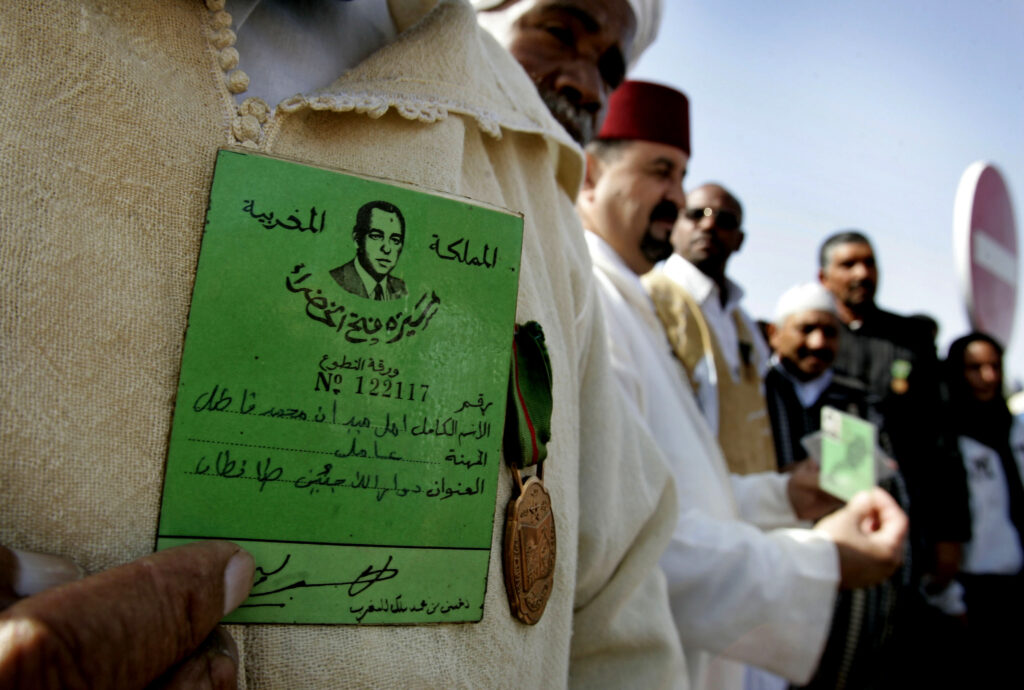
This resolution marks a decisive turn in the future of the dispute, as it eliminates the possibilities of a partition or a referendum, focusing instead on crafting “genuine” autonomy and on the practicalities of the advanced regionalization plan under Rabat’s flag. The document expresses “full support of the Secretary General and his Personal Envoy in facilitating and conducting negotiations taking as basis Morocco’s Autonomy Proposal” and “calls upon the parties to engage in these discussions without preconditions, taking as basis Morocco’s Autonomy Proposal.”
The other previous proposals by the UN Mission for the Referendum in Western Sahara (MINURSO) since the 1991 cease-fire, including a territorial partition or a referendum, were becoming increasingly obsolete and impractical in the eyes of key political players, given the demographic complexities on the ground. Drawing a line in the sand dividing Western Saharan people—who are a transnational community extending from Mauritania to northern Morocco, Algeria, and Mali—would only compound colonial border disputes, which led to the current conflict in the first place.
Similarly, a referendum is nearly impossible. Western Saharan people are not indigenous to the current disputed territories, and any voting lists would have to take into consideration the Hassani people’s movement since the fourteenth century. Not to mention, there is much ambiguity around the populations, which over the past fifty years moved to the Moroccan-administered territories (around 80 percent of the disputed land) and the Tindouf refugee camps in Algeria.
The UN is playing catch-up
While this recent shift is deemed a turning point in the semantic sense, the UN is barely catching up with the fast-evolving realities on the ground. The Moroccan autonomy plan has been gaining momentum since 2020, when US President Donald Trump’s first administration recognized Moroccan sovereignty over Western Sahara and stated that the conflict can only be resolved within that framework.
Soon after, France and Spain—the former colonizers of the region, both at the very source of the current territorial disputes due to the legacy of colonial borders—decided to side with Morocco. Other key international allies have since joined this new momentum in favor of Rabat, including the United Kingdom, Belgium, Israel, and numerous Arab, Latin American, and African countries that opened diplomatic representations or undertook significant investment projects in Western Sahara in support of the Moroccan stance.
The second Trump administration has taken a more assertive approach, largely advocating for the autonomy proposal and offering to host mediations between the parties to the conflict. Trump’s current cabinet has been pressuring the UN, Morocco, and Algeria to push for a fast and sustainable deal—likely seeing resolution to the Western Sahara dispute as low-hanging fruit that Trump can add to his arsenal of peace trophies, according to sources from the current administration.
The United States in September signaled to UN Special Envoy for Western Sahara Staffan de Mistura that the only way forward for the conflict was under Moroccan sovereignty. Washington’s UN funding cuts added more pressure on MINURSO. MINURSO, which was becoming outdated and dysfunctional within the current context, had no other option but to play along to survive.
A firmer US leadership to harness peace
The United States has, meanwhile, been directly pursuing its own mediation efforts outside the corridors of the UN. Massad Boulos, Trump’s senior advisor for Africa, has prioritized the conflict and led several bilateral negotiations to address the dispute with North African leaders over the summer. He has also repeatedly reiterated Washington’s support of Morocco’s claim to the territory, even promising to open a consulate in Dakhla, Western Sahara, to cement this position.
Additionally, US Peace Envoy Steve Witkoff recently revealed in a televised interview that a Morocco-Algeria peace deal could be imminent. The interview, which was conducted alongside Jared Kushner—another strong Rabat advocate in the Trump administration and the de facto broker of the Morocco-Israel peace deal—reveals firmer US leadership aimed at advancing peace in North Africa, starting with Western Sahara.
The United States has been holding the pen on this recent UNSC resolution and trying to shape the conversation in line with its vision of the dispute. An earlier draft leaked to the media this week disclosed a more decisive tone in favor of Morocco and a less nuanced vision for the future of MINURSO, limiting the mission’s renewal to only three months.
Another less-known fervent supporter of Moroccan territorial integrity is the United Arab Emirates (UAE). Abu Dhabi put its full diplomatic weight behind this new resolution by fielding multiple calls with UNSC permanent members, including France and Russia, to ensure their support of the US-proposed draft, according to my discussions with diplomatic sources.
Besides the UAE’s long-term push to build a pan-Abrahamic bloc in North Africa with Morocco, Mauritania, and Sahel countries, its president, Mohamed Bin Zayed, also has a lesser-known connection to the dispute. Indeed, the UAE president had lived and spent his formative years at the Royal Academy in Morocco. At age fourteen, he became one of the youngest participants of the 1975 Green March to Western Sahara alongside members of the Moroccan kingdom’s royal family. Once more, the UAE is walking along its historical ally, pouring thirty billion dollars in investments into the North African country and becoming the first Arab state to open a consulate in Laayoun, Western Sahara, in 2020.
The challenges ahead for an autonomy plan
Now that the diplomatic dust has settled, all eyes are on Morocco and whether it can practically operationalize its autonomy plan.
Rabat has been heavily investing in ambitious infrastructure and strategic projects in Western Sahara. Projects include the Atlantic Initiative, which is promising economic prosperity and integration for Western Sahara with landlocked Sahel neighbors. Additionally, the Dakhla Atlantic Port, a $1.2-billion project, is estimated to handle 35 million tons of goods a year starting in 2028. Other strategic projects include significant investments in adventure and business tourism infrastructures.
However, economic prosperity alone cannot guarantee a sustainable and genuine autonomy plan. Morocco will have twelve months to deliver a detailed, advanced regionalization workplan that outlines the territories’ governance and economic management through elected local representatives. This will also require constitutional reforms and a referendum on the Moroccan side, but, more importantly, an agreement from the Polisario Front to sit at the negotiation table and to operate under the Moroccan flag—a distinct challenge given their rejection of the resolution.
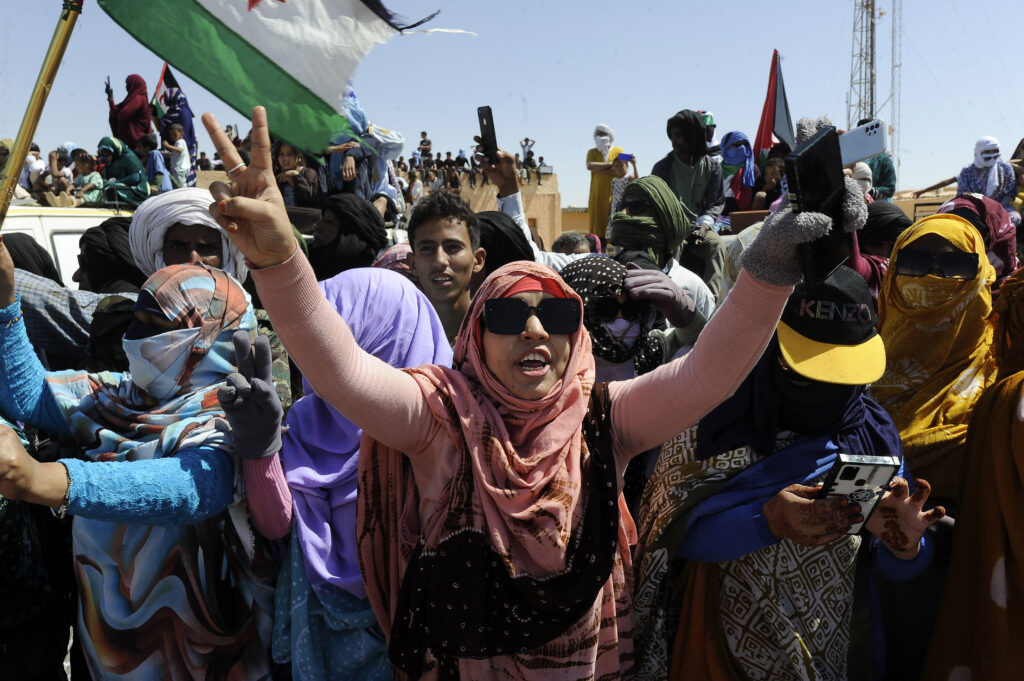
Meanwhile, serious diplomatic moves are at play. The Moroccan king recently visited the UAE. Additionally, there are signs of appeasement between Algeria and France, with Algeria’s recent pardon of detained French-Algerian writer Boualem Sansal, a prominent advocate of a Moroccan Western Sahara.
King Mohamed VI also clearly stated in his address following the vote that he wants “no winners or losers” in this conflict and invited “his brother,” the president of Algeria, to revive the Maghreb Union together. These are all positive signals for meeting Witkoff’s prediction of a Morocco-Algeria peace deal within the next sixty days.
The UN Western Sahara resolution is an essential milestone in US leadership, aligning the international community with “the most credible and realistic” solution to end the fifty-year-long agony of the Sahrawi people. Still, much needs to be unpacked at the levels of local governance, economic resource management, and local culture promotion to achieve “genuine autonomy,” and to organize a second, peaceful Green March.
Sarah Zaaimi is a nonresident senior fellow at the Atlantic Council’s Middle East Programs. Her research focuses on North Africa, the Western Sahara conflict, and Arab-Israeli normalization.
Further reading
Thu, Jan 30, 2025
The roots of recent Algeria-France tensions are deeper than it may seem
MENASource By
Algeria’s fear of growing international isolation, coupled with growing internal tensions in French domestic politics, risk aggravating misunderstandings between the two countries.
Mon, Nov 18, 2024
Iran has ambitions in Western Sahara. Trump can contain them by bolstering ties with Morocco.
New Atlanticist By Sarah Zaaimi
Deepening ties with Morocco can help the United States thwart Iran’s plans in the Sahel and unlock investment opportunities in the region.
Tue, Jan 21, 2025
How the Gaza war brought Morocco and Israel closer
MENASource By Sarah Zaaimi
Security cooperation between Israel and Morocco is flourishing and has never been stronger, driven by a common Iranian threat and a shared vision for regional integration.
Image: October 31, 2025, New York, New York, USA: MIKE WALTZ, Permanent Ambassador of the United States to the UN, listens to Algeria PA, AMAR BENDJAMA in the Security Council after a vote on a resolution endorsing Morocco’s autonomy plan for Western Sahara under its sovereignty. The resolution passed with 11 votes in favor, 3 abstentions, and one non-participation by Algeria. (Credit Image: © Bianca Otero/ZUMA Press Wire)
